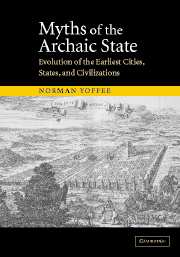Book contents
- Frontmatter
- Contents
- List of figures
- List of tables
- INTRODUCTION
- 1 THE EVOLUTION OF A FACTOID
- 2 DIMENSIONS OF POWER IN THE EARLIEST STATES
- 3 THE MEANING OF CITIES IN THE EARLIEST STATES AND CIVILIZATIONS
- 4 WHEN COMPLEXITY WAS SIMPLIFIED
- 5 IDENTITY AND AGENCY IN EARLY STATES: CASE STUDIES
- 6 THE COLLAPSE OF ANCIENT STATES AND CIVILIZATIONS
- 7 SOCIAL EVOLUTIONARY TRAJECTORIES
- 8 NEW RULES OF THE GAME
- 9 ALTERED STATES: THE EVOLUTION OF HISTORY
- Acknowledgments
- References
- Index
5 - IDENTITY AND AGENCY IN EARLY STATES: CASE STUDIES
Published online by Cambridge University Press: 22 September 2009
- Frontmatter
- Contents
- List of figures
- List of tables
- INTRODUCTION
- 1 THE EVOLUTION OF A FACTOID
- 2 DIMENSIONS OF POWER IN THE EARLIEST STATES
- 3 THE MEANING OF CITIES IN THE EARLIEST STATES AND CIVILIZATIONS
- 4 WHEN COMPLEXITY WAS SIMPLIFIED
- 5 IDENTITY AND AGENCY IN EARLY STATES: CASE STUDIES
- 6 THE COLLAPSE OF ANCIENT STATES AND CIVILIZATIONS
- 7 SOCIAL EVOLUTIONARY TRAJECTORIES
- 8 NEW RULES OF THE GAME
- 9 ALTERED STATES: THE EVOLUTION OF HISTORY
- Acknowledgments
- References
- Index
Summary
Feminists can no longer assume substantial commonalities in the power held, exercised, or suffered by women as women; their own critical and empirical explorations make it clear that, even within a single society, the extent and kinds of power women exercise varies dramatically across class, race, and ethnic divisions, and also through the life cycles of individual women.
(alison wylie 1992:59)The term “agency” is much in vogue in the archaeology of the early third millennium AD (Dobres and Robb 2000), but archaeologists have not agreed on its meaning. It has been, for example, the subject of a recent essay in which an archaeologist discusses how great men achieved status and transformed traditional societies by getting access to guns or iron axes (Flannery 1999). This is held to explain how the old order succumbed to the forces of European progress. “Agents,” however, are not just powerful men, but can be anyone. They are people who belong to several kinds of social groups simultaneously and who must negotiate their economic and social status and even their identity in certain historical moments. Modern archaeologists want to study how individuals experience material conditions and how new beliefs and meanings are inscribed in individual lives, especially in times of social change (Meskell 2003). Archaeologists who infer beliefs from material culture subscribe to the motto of William Carlos Williams, “no ideas but in things,” and historians have always been able to study the lives and actions of individuals as depicted in texts. Historical archaeologists are doubly armed.
- Type
- Chapter
- Information
- Myths of the Archaic StateEvolution of the Earliest Cities, States, and Civilizations, pp. 113 - 130Publisher: Cambridge University PressPrint publication year: 2005

